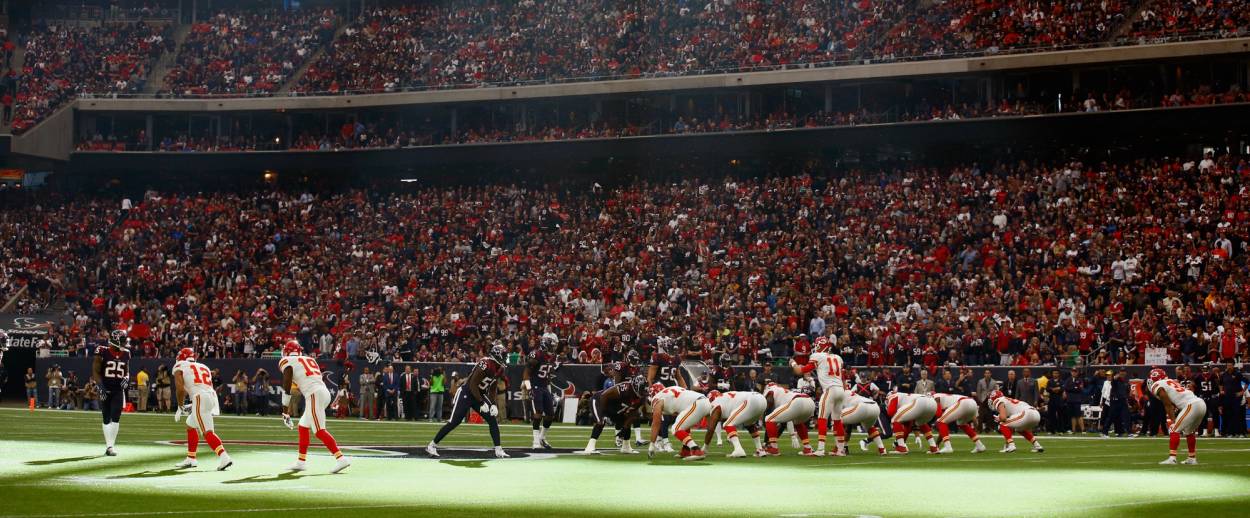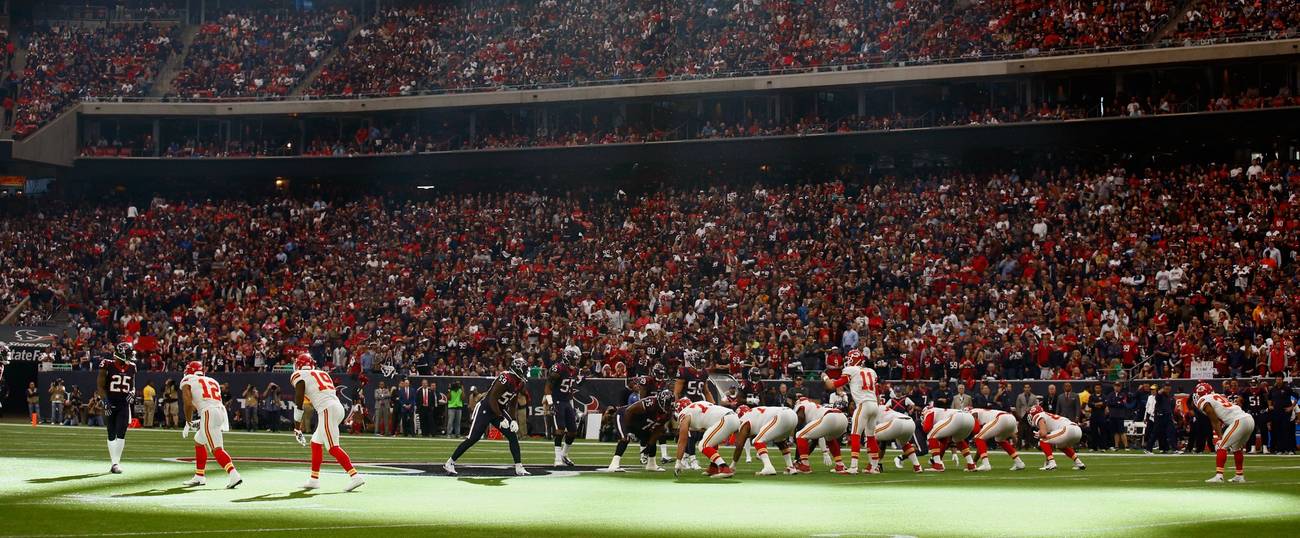The NFL as Religion
God, money, God, money, God, money, God, money, and Tostitos




The NFL’s product is excellent; undeniable when it matters most. In fact, the NFL Playoffs, which commenced on Saturday, are probably the surest bet in sports. The games are typically competitive to the end—three of four games this weekend were close into the fourth quarter, and two came down to the wire in dramatic oh-no endings you couldn’t write, as they say. The players are freaks of nature, beautiful beasts who comprise some of the largest, fastest people on the planet. And they do incredible things that require levels of strength, agility, and precision that no other sport, I would argue, necessitates from its top athletes.
But there are plenty of reasons to abstain from watching the NFL on TV: last year, one multi-millionaire, whose fumble contributed to his team’s loss on Saturday, was suspended in part because he beat his son’s privates with a tree branch; another, Ben Roethlisberger, has been accused of sexual assault twice during his career; and the commissioner of the league, meanwhile, once flubbed an investigation into one of his players who knocked out his wife in an Atlantic City casino, among other apparent bouts of idiocy. Oh, and that thing called CTE, brought about by the inherent brutality of the sport of football itself.
None of this, however, feels more present—and vexes me—during a television broadcast of a high-stakes American professional football game than the tried-and-true messaging of the NFL and its sponsors. The ideological synergy between the game itself, and the commercials, is something to behold. Together, it’s religion.
There is no such thing as watching an NFL game on television without, in the end, being coated in an ideological lather so thick that only a jackhammer made of pure diamond could chip it off. This is obvious, many of you will say. It’s the lay of the corporate land, the tapestry of American sports media in 2016. And this is true. But it’s really sick.
Over the weekend I took stock of some of this messaging—the ploys of corporate American evangelism and football masquerading as a way of life, a way of being to strive for on this here planet—that the NFL force feeds viewers through via lofty visuals, words, and a rotating roster of idols. Here’s a broken-down version of this finely-tuned package of American jingoism wrapped in a candy shell made from Tostitos, which tastes like heroism and goes down easy:
Numbers
I like numbers. They’re familiar to me, like the word “Oreo,” or a mug. The NFL, “a game of inches,” uses lots of numbers that I recognize. I watched the beginning of the first game, a blowout victory for the Kansas City Chiefs over the Houston Texans, on mute. Upon the 50-something-inch television in front of me showed a graphic about J.J. Watt, the Texans’ star defensive lineman, whose face was accompanied by a big star and the numbers 96 and 100, which I know count as A’s in class, hence success.
And there are endless graphics of #1 draft picks, and lists, which commonly denote history. And the field is brandishes with numbers like 10 and 20 and 30 and 40 and 50 and then 40 and 30, and my brain recognizes a trend, and computes that the long green horizontal image in front of me is made of segments, which also helps me to understand the greatness of Deandre Hopkins, one of the NFL’s most prolific wide receivers who is just 23 years old (I was 23 years old once, too!), who had something like 111 catches, which is 11 more than 100, and a hundred of anything is a lot.
And then there’s a commercial touting McDonald’s “McPick” option, which gives customers two pieces of food for $2, which means that each thing costs a buck, which is really good deal, especially in this day and age, and one that I could probably afford on my next road trip when I run out of cash and am beholden to the change in the passenger seat of my non-existent car where I know I could scrounge up $2! And if I can’t scrounge up $2, I bet I could find 50 cents, because 50 cents will get me a coffee at 7/11 “just the way [I] like it,” which will hold off my appetite until I can find an ATM.
Speaking of money, what is the cost of courage? Well, according to this trailer about bombs and stuff in this place called Benghazi, the cost of courage is—wait, I can get a brownie cookie from Dominos for just $6, and it’ll ooze like that too?—a Toyota Tacoma, which can bring me up the mountain, to the mountain top, where I’ve always wanted to go, much like Arnold Schwarzenegger, who reminds me that I shouldn’t send a dozen choppers when I only need to send one, when I download and play Mobile Strike from a number of app stores from the phone that—oh, snap!—is totally in my hands right now!
Speaking of needing only 1 player, there goes kick returner Knile Davis running back a ball that sails in the air at a discernible arc, all the way to the other side of the field in what I learn is 106 yards, which, if I had that in pennies, would mean that I could afford two coffees at 7/11—one for me, and one for my friend—and still have 6 cents left over.
Words and images, most of which are superlative in nature
Everything, during an NFL broadcast, has its rank. And if a word or phrase’s value isn’t obvious, it’s at least evocative. There are wild cards and streams of blood that come from men’s noses. The blood, which streams, does not stop these men, who play through the pain (what pain?). Before the game, fans—normal people just like you—line the perimeter of the field, at the foot of the cathedral itself, and lift up and push down a piece of the biggest American flag you’ve ever seen, which is an extraordinary sight, and makes these normal people extraordinary, because they are a part of making this flag synthetic wave.
And there are special teams, and the announcers say things like “one of the best in the business” and “positive yardage” and “outstanding” and “add a line to his resumé,” and I can relate to this because I too have a resumé. And the announcers say other things too like “huge assignment” and “one of the great pass rushers in Chief history,” along “mentally tough” about a quarterback who is having a horrible game. Mental toughness, I learn, is part of the game, a necessity for these players who aim to persevere despite tens of thousands of people—fans, followers—who boo up the place. Necessary too are things like “second efforts” (faith?), like coming back from disc surgery in July. That’s performance. And performance is also something that Northrup Grumman, a company that makes bombers and stuff, possesses. And thankfully so, because America is something that I want to protect, a land whose soil I wish to remain fertile forever. Because America is where I’m from, and where I’m from is important to me, just like it is for Coors, who reminds me, after a number of seconds run down and an oblong orb made of pig skin travels through the air, which sometimes stops those seconds, that where I’m from shapes me, and inspires how I do things, which should be big and in the best way, like the smooth Rocky Mountain taste of Coors Light.
Gods everywhere, God is everywhere
As I watched this weekend’s games, I kept asking myself: Who is God in this situation, this structured belief system called football, and who are God’s followers? Ori s there more than one God? And what does the ball represent, or the referees, for that matter, or those flags that are sometimes yellow and sometimes red? There are so many mechanisms at play that it was tough to discern them all. In the end, though I’m not entirely sure, but I do know that investing has changed, which is what the young man in front of me tells his father over dinner, who is surprised that his son doesn’t have to pay broker fees.
And maybe who is God in the religion of the NFL, or which entity is God, is the wrong question. Maybe the better focus is the fact that the NFL ensures that its viewers know it’s everywhere, like God’s apparent ubiquity: so the NFL is God, and if it’s not a God, then it sure does watch and see everything—at the goal line, inside of a pylon, hung from a wire above the field. And on four different channels, no less, and accessible through every device you own. (You know who else saw every angle? Jack Focker, played by Robert De Niro, who is now playing a dirty grandpa in theaters soon.) And if the umpteen camera angles are not enough, remember that when the NFL shows replays they cast lights from above that highlight individual players, or they cover them in a ring, like the halo of an angel, who happens to earn his money by diving head-first into another man. And despite this rivalry between men, remember what matters most: family. And quick mortgages, like a Rocket Mortgage.
The truth is that the NFL is stuck in its messaging, just like the U.S., but that’s never been a problem it can’t fix. The religion of the NFL is unquestionable. Worse, and even though it deters me, is that I’m an adopter; I come back every time despite my knowledge of the crud that’s being chucked at me. Just like crud that Bengals fans threw at Ben Roethlisberger as he exited the game initially with an injury. The announcers excoriated those fans’ behavior, as though blind to the culture of war and jingoistic fervor the NFL creates and inspires in their fans (please visit NFLshop.com to get your jersey today).
But “wait until you see this development,” said some talking head, when Roethlisberger came back into the game, which his team eventually won. Through the rain he came, through the pouring rain, and out onto the field he jogged, a steel of a Steeler who can foment things like zone reads and jet sweeps, who can air it out. Roethlisberger is a warrior, like the Toyota Tacoma, which drives better when its driver is fueled on a hand-crafted caramel milk drink from Dunkin’ Donuts, which will lift your spirits. Same time next week.
Jonathan Zalman is a writer and teacher based in Brooklyn.